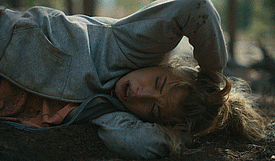Devastatingly heartbreaking, “Mobile Homes” delivers a career-best performance from Imogen Poots.

Even clichés get it right from time to time. A house is a house, but what populates it, what lives in it, makes it a home. This is the heart of writer/director Valdimir de Fontenay’s Mobile Homes, a character drama exploring this very notion through the eyes of a mother more lost than she realizes. What transpires is fairly simple and occurs without a great deal of bombast; nevertheless, audiences may yet still find themselves shaken by Imogen Poots’s (Green Room) raw, career-best performance. This, plus the excellent cinematography and direction, make Mobile Homes a film capable of a quiet, yet powerful resonance.
Ali (Poots) and her son Bone (newcomer Frank Oulton) travel with Ali’s boyfriend Evan (Callum Turner), assisting him with each of his money-building schemes, dreaming of the day they can stop diner ditching, selling drugs, transporting roosters for cockfights, and, maybe, just maybe, get a real home instead of whichever motel is nearby or owner-less house they can break into. Though Ali and Evan are passionate for each other, Bone is almost always treated as a third-wheel or an expendable tool for Evan’s various plans. When Bone ends up in real trouble, Ali finds herself having to make a hard choice between her dreams and her child, surprising herself with the decision. With no home and no money, Ali and Bone end up seeking shelter in a mobile home community that opens their eyes to the kind of life either had only ever imagined. But, when you’ve never had a place to call your own, how well will you be satisfied with what you have?
Exuding a cinéma vérité style, Mobile Homes is a completely stripped-down, honest production from start to finish. More often than not, the audience will feel an encroaching sense of peering in on Ali, Evan, and Bone as the trio make their way through whichever wintry town their locked in. Given the personal nature of the story, itself a creation from de Fontenay’s own nomadic upbringing, this is not incredibly surprising as the style sublimely enhances the realistic tension and inherent drama at the core of the three individuals. Nothing happens, nothing’s said without meaning because Mobile Homes is art; however, like life, sometimes nothing happens and nothing’s said because that’s the most honest expression of the moment. de Fontenay acknowledges this within the script, using this to call upon his performers to convey nuance and intent where words fail. One example is when Ali and Bone use a public bathroom to clean themselves and warm up from the cold. Other writers would fill this moment with endless words, streams of words, to tell the audience how to feel. Here, however, it’s up to Poots and Oulton to communicate without the distraction of dialogue, somehow cutting through endless bullshit and getting straight to the truth. It’s a painful scene to observe, made more so by the way de Fontenay embeds the audience with the characters on their journey.
Imogen Poots as Ali in the road drama “MOBILE HOMES,” a Dark Star Pictures and Uncork’d Entertainment release. Photo courtesy of Dark Star Pictures and Uncork’d Entertainment.
Exuding a cinéma vérité style, Mobile Homes is a completely stripped-down, honest production from start to finish. More often than not, the audience will feel an encroaching sense of peering in on Ali, Evan, and Bone as the trio make their way through whichever wintry town their locked in. Given the personal nature of the story, itself a creation from de Fontenay’s own nomadic upbringing, this is not incredibly surprising as the style sublimely enhances the realistic tension and inherent drama at the core of the three individuals. Nothing happens, nothing’s said without meaning because Mobile Homes is art; however, like life, sometimes nothing happens and nothing’s said because that’s the most honest expression of the moment. de Fontenay acknowledges this within the script, using this to call upon his performers to convey nuance and intent where words fail. One example is when Ali and Bone use a public bathroom to clean themselves and warm up from the cold. Other writers would fill this moment with endless words, streams of words, to tell the audience how to feel. Here, however, it’s up to Poots and Oulton to communicate without the distraction of dialogue, somehow cutting through endless bullshit and getting straight to the truth. It’s a painful scene to observe, made more so by the way de Fontenay embeds the audience with the characters on their journey.
Imogen Poots as Ali in the road drama “MOBILE HOMES,” a Dark Star Pictures and Uncork’d Entertainment release. Photo courtesy of Dark Star Pictures and Uncork’d Entertainment.
Being a smaller story touching on grand themes of family and home, if the visuals don’t grab you, then the performances will. Poots truly gives the performance of her career. Whether joy or pain, pleasure or terror, Ali comes to life through the details of the delivery. The difference between the off-handed way Ali nonchalantly tells a desk attendant that Bone knows his way home after they accidentally separate vs. her constantly scanning the crowd at the mobile home community so she knows where Bone is communicates not just where her relationship with her son exists, but how she herself is changing. Turner plays Evan, a truly charming, charismatic, enterprising young man, who does want to provide for the two people he considers family but also as someone waiting for the right deal to ditch them. Perhaps he stays out of loneliness or for their usefulness, but, either way, it’s Turners performance that makes Evan someone we want to watch. Mobile Homes is Frank Oulton’s first film and it’s a fantastic debut. On the whole, Oulton doesn’t have much to do compared to Poots or Turner, especially because he, as a character, is hardly explored; however, his character is the focal point around which everything revolves, making Oulton’s ability to connect with Poots and to make Bone feel real to the audience integral to the success of Mobile Homes. Without Oulton infusing Bone with a quiet steely nerve, Bone would be a prop bouncing along through the narrative. Instead, Oulton’s frequently dialogue-free performance manages to convey a sad loss of innocence while on the road and a joyous recognition when he regains it at the mobile home community. Appearing in a small role with significant implications is Callum Keith Rennie (Californication) as Robert, the manager of the mobile home community that takes in Ali and Bone when they need it. Expectations call for his character to be some kind of savior for Ali, and he is, just not in the way audiences will expect. In lesser hands, Robert would merely function as an angelic voice for Ali to grow from under a romantic wing. Instead, Rennie injects some melancholy into the character, making Robert appear more as a guide offering tools for Ali to fix herself and to help her create a home.
de Fontenay’s Mobile Homes is a deeply profound story whose characters offer no real answers and are given no true conclusions. Like the very documentary-style direction and cinematography, Mobile Homes lives and breathes, rising with every triumph and crashing with every set-back. It’s a devastating story of a woman learning to become a mother far too late, forever fearing she’s lost the chance to have the life she’s dreamed of. The mobile homes of which the film takes it’s name are often looked down upon for their perceived mediocrity, yet what they offer changes lives. Mobile Homes seems to ponder what happens if we, the audience, would just consider how we perceive what we value and to recognize within ourselves whether we’re cultivating a house or a home.























Recent Comments